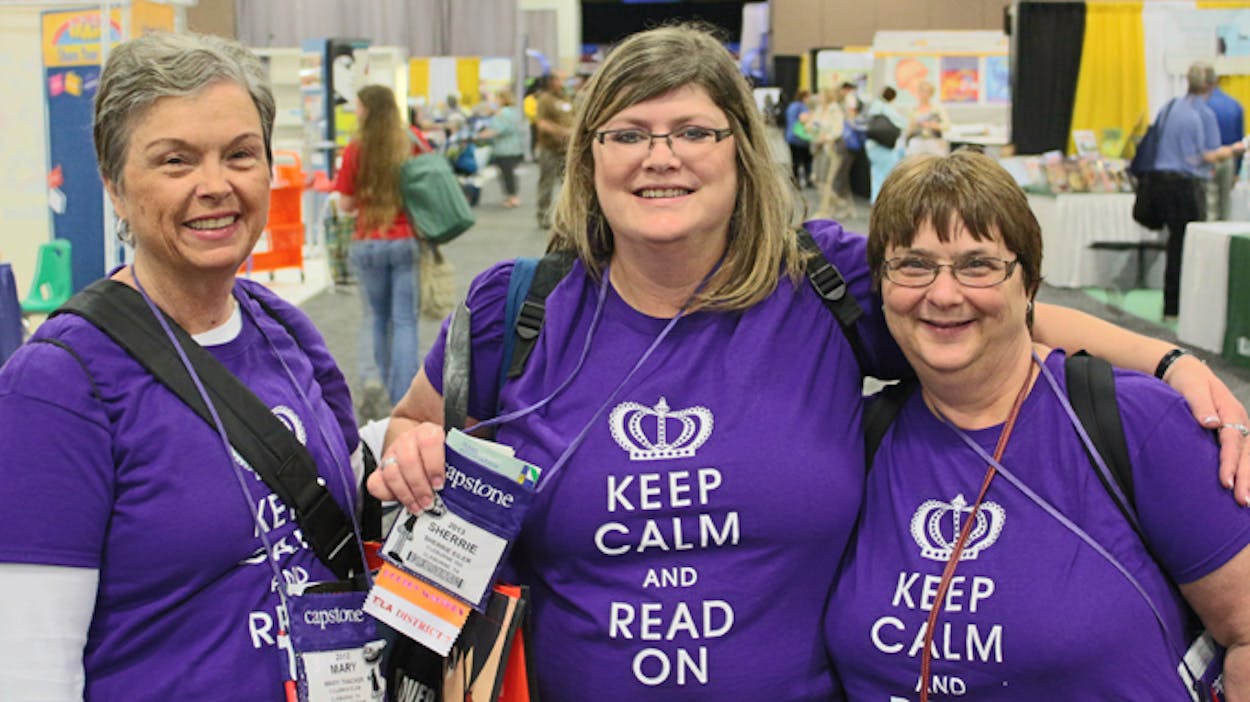As a group, they don’t exactly shatter stereotypes, with one exception. They do carry canvas tote bags, two or three each, handles frayed by the weight of books. They do wear endearingly dorky T-shirts emblazoned with phrases like “Authors Are My Rock Stars” and “Keep Calm and Read On.” At spare moments—at every spare moment—their heads do bow into their books, their Kindles, their iPads. But when six thousand of them are gathered together in the Fort Worth Convention Center, they are not particularly quiet.
“Are all of these people really librarians?” an outsider was heard to ask, on the first afternoon of the Texas Librarian Association’s annual April convention. Yes, every last one. Just peruse the names of the panel discussions on the four-day schedule if you don’t believe it. “Transliteracy and the 21st Century Learner.” “Reference Librarians and Private Investigators: More Alike Than You Knew!” “Sex in the Library” (alas, not a how-to, but a debate about whether books like 50 Shades of Grey should be on library shelves).
These are tough times for our state’s libraries. In 2011, Governor Perry signed a budget that slashed funding for the governing body that oversees public libraries by 64 percent, from $20.6 million to $7.3 million, and cut appropriations for local library programs by 88 percent, from $12.8 to $1.6 million. While most local public libraries are funded by city and county taxes, that state money is often critical—for some smaller-town libraries, it comprises the entirety of their book-purchasing budget. (In the just-passed 2013-14 budget, the Library and Archives Commission is set to receive $11.7 million—still 44 percent less than its 2010–2011 numbers.)
Meanwhile, the rise of digital publishing and e-books is introducing a whole new set of problems for librarians. Fearful of piracy and desperate to maintain ever-diminishing profit margins, the major publishers either charge outsized amounts for digital copies of their books, or deny libraries e-copies altogether. So what’s a modern librarian to do?
Cecilia Barham, the tattooed and spirited, 45-year-old director of the North Richland Hills Public Library, thinks the solution is a louder voice and an attitude adjustment and that her generation and everyone younger are well-suited for this. “[We’re] quick to accept change because we’ve grown up with rapid change,” she says. On the fourth day of the convention, Barham introduces a talk by another bibliophile determined to revitalize libraries, Michael Porter, president of the Seattle-based non-profit Library Renewal. (On Twitter, Porter, has fashioned himself as “Libraryman,” a superhero complete with a blue-spandex-and-cape clad avatar.)
Porter predicts an overhaul and wants libraries to invest in “hackerspaces” and “fab labs,” community gathering spaces with computers, audio video equipment, and even machine tools, where patrons are encouraged to create their own digital and physical inventions. He also thinks libraries need to develop their own e-content distribution systems since publishing houses often make it cumbersome to transfer books onto e-reading devices and sometimes restrict how many times e-books can be loaned.
After his talk, though, Barnham and Porter get into an argument—in so far as that’s possible for a soft-spoken guy wearing a pink shirt and a purple nametag around his neck and a woman who includes smiley face emoticons in at least half of her emails.
“I just wish people would stop using the word ‘crisis’ to talk about libraries,” Barham says.
“I think it gets people to pay attention,” Porter counters.
“We’re framing the discussion the wrong way,” Barnham continues. “We’re saying things like ‘crisis’ and ‘are we relevant?’ Doctors don’t go around talking about whether they’re relevant. . . . If people believe in your profession, you don’t constantly need to defend it.”
And maybe Barnham is right—that there is a future for Texas libraries. On Saturday afternoon at the convention, I wander from a lunchtime talk by Chilean novelist Isabel Allende (“She was much bawdier the last time,” says one of my tablemates, evidently disappointed) to a book signing with fantasy writer Neil Gaiman, where one twentysomething librarian, meeting her literary hero, burst into tears. Even My Big Fat Greek Wedding star Nia Vardalos is here, pitching her new memoir—surely a sign that librarians still command respect within the book industry.
Optimism, and wine, prevails at the Saturday wrap-party. The event organizers take to the mike to recount the funniest moments from the past few days, and I fall into a great conversation with an entrepreneurial director of the Bellair public library until another librarian at our table interrupts: “Shhhh.” She can’t hear the speaker, who is recounting a mishap-filled tale about escorting Vardalos around to the convention center.
We lower our voices and continue our conversation, though only a minute longer.
“SHHHHH,” this time much louder and more insistent—and we cast our eyes sheepishly to the ground, and promise that’s the last she’ll hear from us.
- More About:
- Politics & Policy






